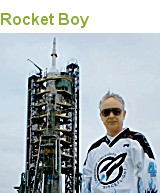 Jeffrey Marlow in Wired reports on the question posed by the Aeronautics and Space Engineering Board: “What good is human spaceflight?” And they want our answers. They are preparing a report to “review the long-term goals, core capabilities, and direction of the U.S. human spaceflight program.” Our responses must be no more than four pages, and they issue three guidelines covering the benefits and the challenges, and what might happen if the US abandoned manned spaceflight. I’m not going to enter a formal submission, though please feel free to do so. I am, however, entirely happy to set out my own reasons on why I think manned spaceflight is a good idea.
Jeffrey Marlow in Wired reports on the question posed by the Aeronautics and Space Engineering Board: “What good is human spaceflight?” And they want our answers. They are preparing a report to “review the long-term goals, core capabilities, and direction of the U.S. human spaceflight program.” Our responses must be no more than four pages, and they issue three guidelines covering the benefits and the challenges, and what might happen if the US abandoned manned spaceflight. I’m not going to enter a formal submission, though please feel free to do so. I am, however, entirely happy to set out my own reasons on why I think manned spaceflight is a good idea.
Obviously unmanned missions cost less and can achieve magnificent results. Our knowledge of the moons of Jupiter and Saturn derives from the Voyager, Cassini and Galileo missions, and the photos are breathtaking. The Mars rovers illustrate what we can do and learn without sending humans there. But there is more. We want humans in space and on the moon and planets because it is thrilling that our species can do this, and because we think it might be an important part of its future. It is harder to send people than machines, but we identify with people and we think that if brave explorers venture there now, our children might follow later. Ultimately some of us think that this is an important step in the story of our species. Our ancestors crawled from the primeval sea. Twelve thousand years after cavemen left their caves they left their footprints on the moon. Those of us who were weaned on science fiction want humanity to be a space-faring species. As we once roamed the seas on voyages of discovery, now we want our descendants to journey to the edges of infinity, and even to the dark spaces between the stars.
I won’t be putting in a submission because for me it isn’t really about benefits and challenges, or whether American or Chinese astronauts will be part of it. It is part of the limitless ambition I have for my species. I have on my wall a huge block-mounted photo of the blue and white Earth seen from space. It is my favourite planet, but our descendants may think otherwise.
Filed under: Updates |










A man or woman scientist can do in a day what a robot might take a week or a month to do. Several crew can do in one expedition what several missions with robots would do. We simply have to establish colonies off our rock. The solar system beckons. It’s time to colonise.
I find the concept of an Aeronautics and Space Engineering Board on this evidence rather dispiriting. It makes me think of the Milk Marketing Board, or the Egg Marketing Board, or the Potato Marketing Board and all the other boards like them. Another government-funded lobby group with the purpose of lobbying government for more government money to spend on government approved projects. How much, dare I ask, will it cost to read and process what might be thousands if not millions of “not more than four page” submissions? Do they really think this exercise will have as much impact as President Kennedy speaking for two minutes on putting a man on the moon? You don’t have to be a rocket scientist to figure that one out.